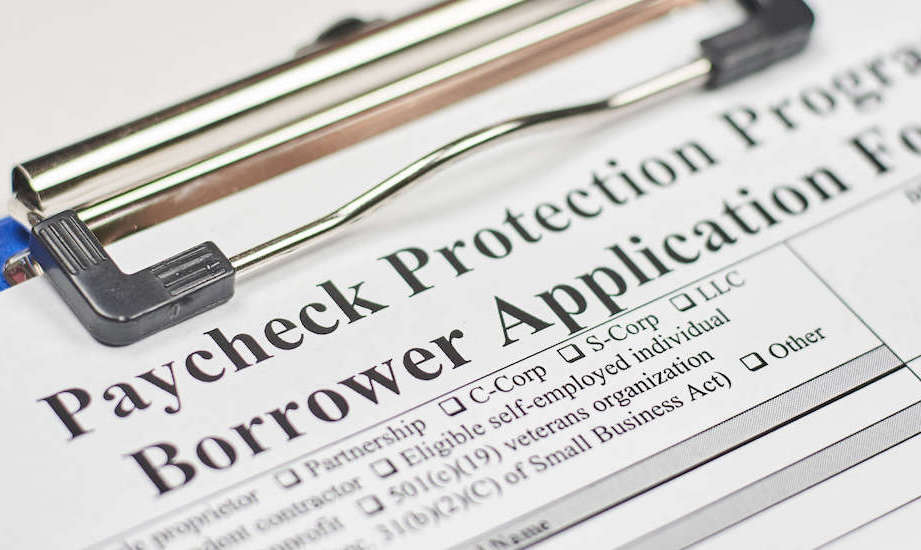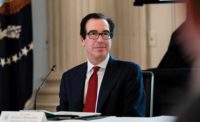One day after the Associated General Contractors of America sued the U.S. Small Business Administration and Office of Management and Budget to prompt a language change in the questionnaire used to evaluate if applicants are eligible to have Paycheck Protection Program loans forgiven, SBA issued added guidance related to the document.
The agency said on Dec. 9 that in reviewing a company's good-faith certification that "economic uncertainty" made the PPP loan necessary to support the borrower's "continuing operations," it would look at the applicant's "individual circumstances."
[View SBA Dec. 9 guidance here. See p. 19, Question and Answer #53.]
AGC's lawsuit, filed on Dec. 8 in U.S. District Court for the District of Columbia, contends that the group “is challenging the legality of the questionnaire and the legal adequacy of the process undertaken by both SBA and OMB in developing, approving and publishing the questionnaire for use.”
AGC says that the filing deals with “the manner by which SBA is now making its forgiveness determinations and even second-guessing borrower eligibility for PPP loans in the first place.”
AGC 'Encouraged'
Brian Turmail, an AGC spokesperson, said in a Dec. 10 email to ENR that the association was "encouraged" by SBA's new guidance. But he added that "our litigation remains active" while it seeks "additional clarifications and guarantees" that the agency would base its reviews of the forgiveness applications "on the conditions at the time of the loan application, and not after...."
In its lawsuit, AGC contends that the process that led to the form and the questionnaire itself are in violation of the Paperwork Reduction Act and Administrative Procedures Act.
It asks that the court limit the use of information that companies enter on the questionnaire until SBA changes the data and makes it available to the public.
In addition, AGC asks the court to permanently block SBA from basing a decision to deny an applicant’s petition for PPP loan forgiveness only on information in the borrower’s submitted questionnaire.
The group also asks the court to make the questionnaire available for public comment for at least 60 days and, after reviewing the comments, to revise the form based on those submissions.
AGC also contends that OMB authorized SBA to use the questionnaire “in complete secrecy,” rather than releasing it and allowing a public-comment period.
“Resorting to a secret form that disregards congressional intent and retroactively changes the criteria for a loan is not due diligence; it is unlawful and needs to stop before employers are irrevocably harme.” Stephen E. Sandherr, AGC president and CEO, said in a statement,
An SBA spokesperson said in a statement emailed to ENR that the agency "does not comment on pending lawsuits and litigation.”
Discussions with agency officials
Before filing the lawsuit, AGC representatives “had lengthy conversations with federal officials” regarding the PPP questionnaire and related matters, Turmail told ENR in a Dec. 8 email.
He added that those officials “made numerous promises to us, some of which they fulfilled, but too many others they did not.”
The association has recently joined with several hundred other business groups asking Congress to have the amounts of PPP loan forgiveness be considered tax-free.
But when it came to the issues connected to the questionnaire, Turmail said, AGC did not approach other associations about joining the lawsuit. “This one is our fight because so many of our members have expressed concerns about the SBA questionnaire to us," he said.
The lawsuit states that the questionnaire does not ask borrowers to provide information about their operations, as of the time they applied for the loan, generally done last spring.
Instead, AGC argues, the questionnaire asks for financial information that came later. For example, the complaint says, the questionnaire asks for current bank statements and other information about a company’s current liquidity.
“This contradiction is deeply troubling to many borrowers because their success or failure over the balance of 2020 could not possibly have been knowable in those early days of the pandemic when the economy was headed into a tailspin,” says the filing.
PPP Background
PPP was established in the Coronavirus Aid, Relief and Economic Security, or CARES, Act, which was signed into law in March.
Under the program, companies that applied for a loan could apply later to SBA to have the amount forgiven if they used the proceeds only for payroll, rent and other basic expenses.
Congress included an initial $349 billion for the program. When that was exhausted in less than two weeks, lawmakers later provided an additional $310 billion.
But interest in the program waned and PPP expired on Aug. 8, with $134 billion uncommitted to loans.
SBA also reports that as of Nov. 22, it had received forgiveness requests totaling $83.2 billion.
Story updated on Dec. 10 with new guidance document from SBA.



